Cookie Consent Best Practices: Simplify Compliance With WPLP Platform
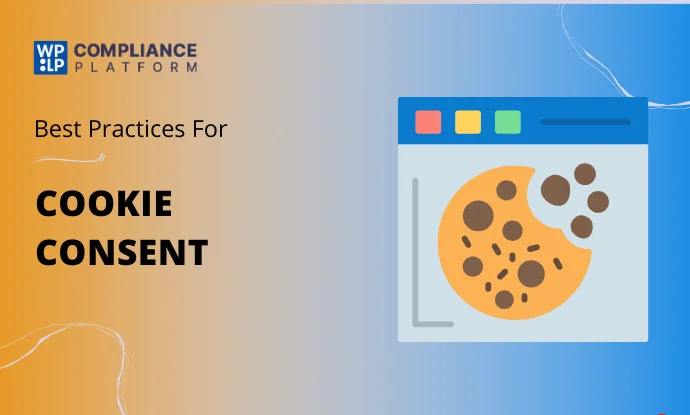
Are you making sure that your site is following the cookie consent best practices?
If not, you’ve come to the right place. We’re here to assist you in comprehending the best practices of how to create and implement a cookie banner on your site.
Each visitor to your site in today’s digital world should have a simple and easy experience.
Because cookie consent banners are needed to build trust with users and are the initial line of defense for websites seeking compliance with many data protection laws.
But how can we implement these critical online cookie consent best practices effectively?
To know more, please join us as we examine the Best Practices for Cookie Banners.
- Understanding Cookies
- What Are Legal Requirements For Cookie Consent Best Practices?
- Legal Frameworks Governing Cookie Consent
- Cookie Consent Compliance: Recommended Practices
- Why WP Legal Pages Compliance Platform Is the Best Cookie Consent Solution
- Designing an Effective Consent Banner
- Obtaining Valid Consent
- Conclusion
Understanding Cookies
Cookies are vital to modern websites, improving user experience and functionality of a website. Tiny text files saved on your device enable websites to recall you when you visit again.
It makes customized content, stored preferences, and easy navigation. Yet, it is important to manage cookies in a responsible way to ensure user privacy is maintained accordingly. Implementing good cookie consent best practices is of utmost importance.
What are Cookies?
Cookies are tiny text files that website servers save on a user’s computer via their web browser when a site is visited. They improve the user experience by enabling sites to recall different information, including user preferences, login details, and session information.
When the same user visits the site again, the browser resubmits the cookies saved to the server, allowing the website to identify the user and adapt the experience in response.
Types of Cookies
Cookies are classified in four broad categories:
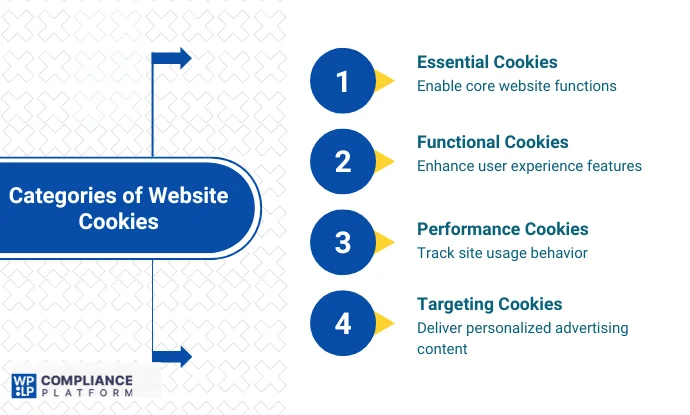
- Essential Cookies: These are essential for the website to work correctly. Mostly, they authenticate users, retain shopping cart contents, and remember language selection.
- Functional Cookies: By allowing the website to provide enhanced functionality and personalization, these cookies improve the user experience. For example, a cookie can remember your preferred font size and color scheme.
- Performance Cookies: These cookies track how a website is accessed, helping the owners of the website learn how visitors navigate the site so they can make improvements, adjustments, or enhancements.
- Targeting Cookies: These cookies record your browsing habits across multiple websites; they are used to trigger targeted ads or display customized content.
Cookies tend to make websites effective and customized for users, promoting user satisfaction and engagement.
What Are Legal Requirements For Cookie Consent Best Practices?
Two major regulations that govern the use of cookies are the General Data Protection Regulation (GDPR) and the California Consumer Privacy Act (CCPA), for ensuring cookie consent best practices.
The provision of such data laws mandates that websites obtain explicit consent from users for the collection of data via cookies. Failure to observe the loopholes laid down by such laws can lead to hefty fines and damage the reputation of those non-compliant.
Consent Requirements and User Rights
To be compliant with cookie laws, websites must provide their users with clear and comprehensive information on:
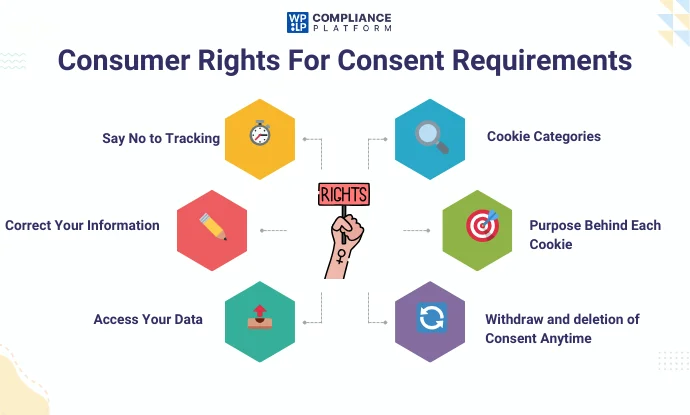
What types of cookies are used on your website? The users have the right to know the different categories of cookies used on your website. Users should also have the right to withdraw consent for cookies at any point.
One of the most essential rights for users is to give them the right to access their personal information, which is collected on your website through cookies. If the user finds out any inaccurate information gathered about them, they have the right to get it corrected.
Users also have the right to object to the processing of their data for marketing purposes, and under certain circumstances, users can also ask to delete the data.
Legal Frameworks Governing Cookie Consent
These frameworks regulate how companies have to inform users about cookies, how to seek consent, and how to preserve preference options. A number of important legal frameworks include:
- GDPR (General Data Protection Regulation) – Implemented within the European Union, GDPR holds that, other than for strictly necessary cookies, companies need users’ clear consent prior to storing any cookies or accessing cookies already stored on the user’s device.
- ePrivacy Directive – Commonly referred to as “Cookie Law,” this directive is intended to supplement the GDPR by focusing on electronic communications and mandating that cookie-use information be transparent and extensive.
- California Consumer Privacy Act (CCPA) – Functioning in the United States, it compels companies to inform their users about their use of cookies and allow their users to opt out of the sale of their personal data, including cookie information.
- Other regional legislations – Various nations have implemented their cookie legislations as well, including the UK’s Privacy and Electronic Communications Regulations (PECR) and Brazil’s LGPD (Lei Geral de Proteção de Dados).
A few of these legislations have shared principles, for example, the principles of transparency, user control, and accountability, but have varying respective requirements that organizations must contend with in seeking compliance.
Cookie Consent Compliance: Recommended Practices
One of the golden rules of cookie consent is to select the right tool for a website. There are various factors to consider to attain compliance, user experience, and efficient administration in using cookies.
The main factors to consider are as follows:-
1. User experience
The software should display an unambiguous, straightforward consent message about the use of cookies, and should allow for an easy granting of consent. The appearance of the consent message should be customizable, so it may be tailored to the website design and brand.
There should be nothing intrusive about the user experience when displaying the consent message. It should be displayed at the right time and in the right way so it does not hinder navigation.
2. Regulatory compliance
The software should complement the requirements laid down by GDPR and CCPA. It should also provide granular control so that one can have explicit consent for various kinds of cookies.
The software shall record user consents, use of cookies, and disclosures, when required.
3. Features
The tool must scan your website for cookies automatically and then advise you of their purpose and usage. Thus, it should allow self-blocking or limiting some cookies on a particular basis of user consent.
The tool should integrate with different web tools and platforms, e.g., analytics tools, CMS, marketing automation platforms, etc.
4. IAB TCF and Google Consent Mode Requirements
Using IAB TCF and Google Consent Mode together is important for cookie consent best practices. IAB TCF was developed to comply with data privacy laws such as GDPR and to provide a standardized way to collect and share user consent with advertising vendors.
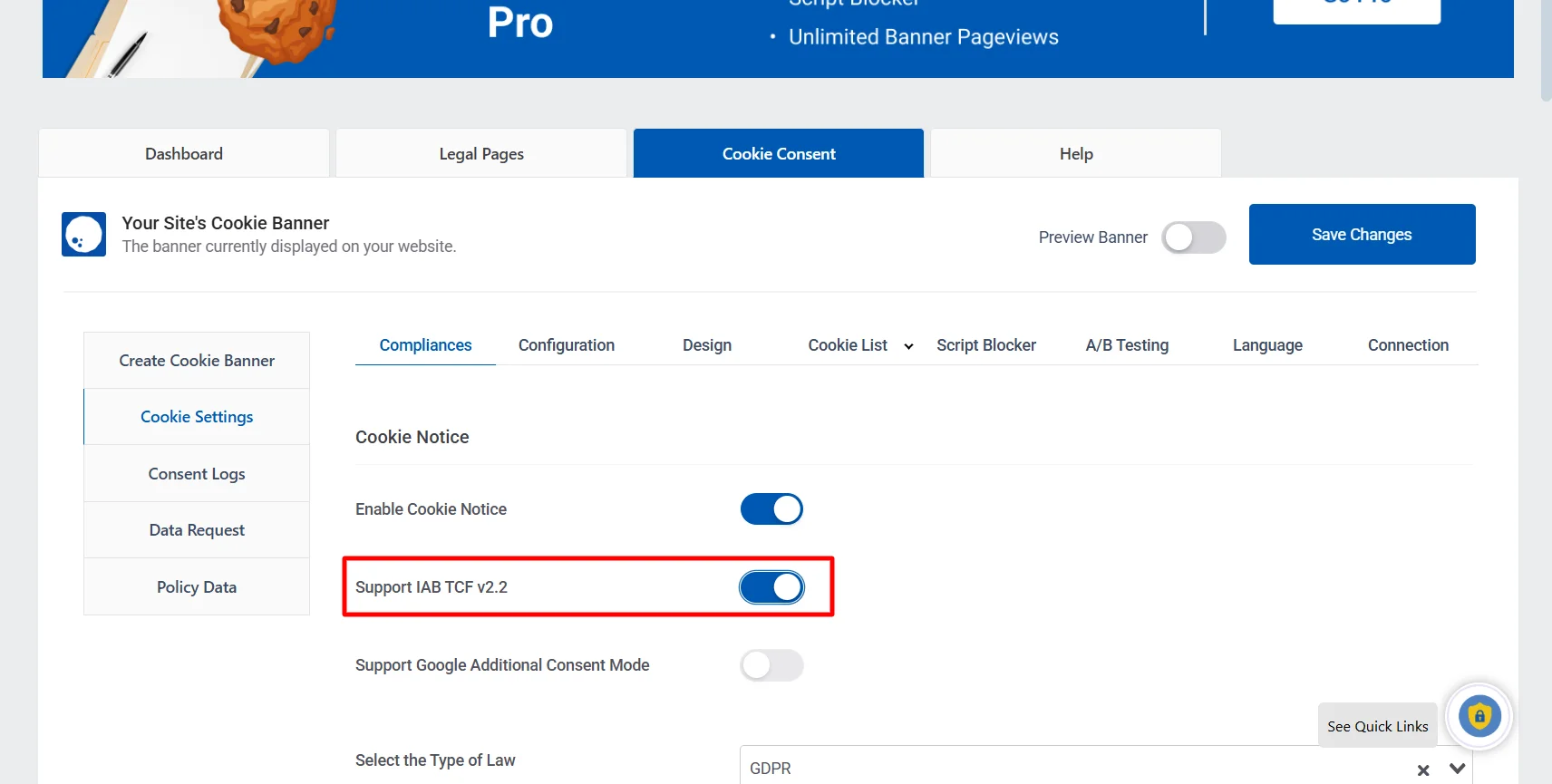
While Google Consent Mode allows websites to operate Google services (like Ads and Analytics) while respecting the user’s consent choices. By utilizing IAB TCF and Google Consent Mode together, you can ensure that your CMP is legally compliant and ad-tech compliant.
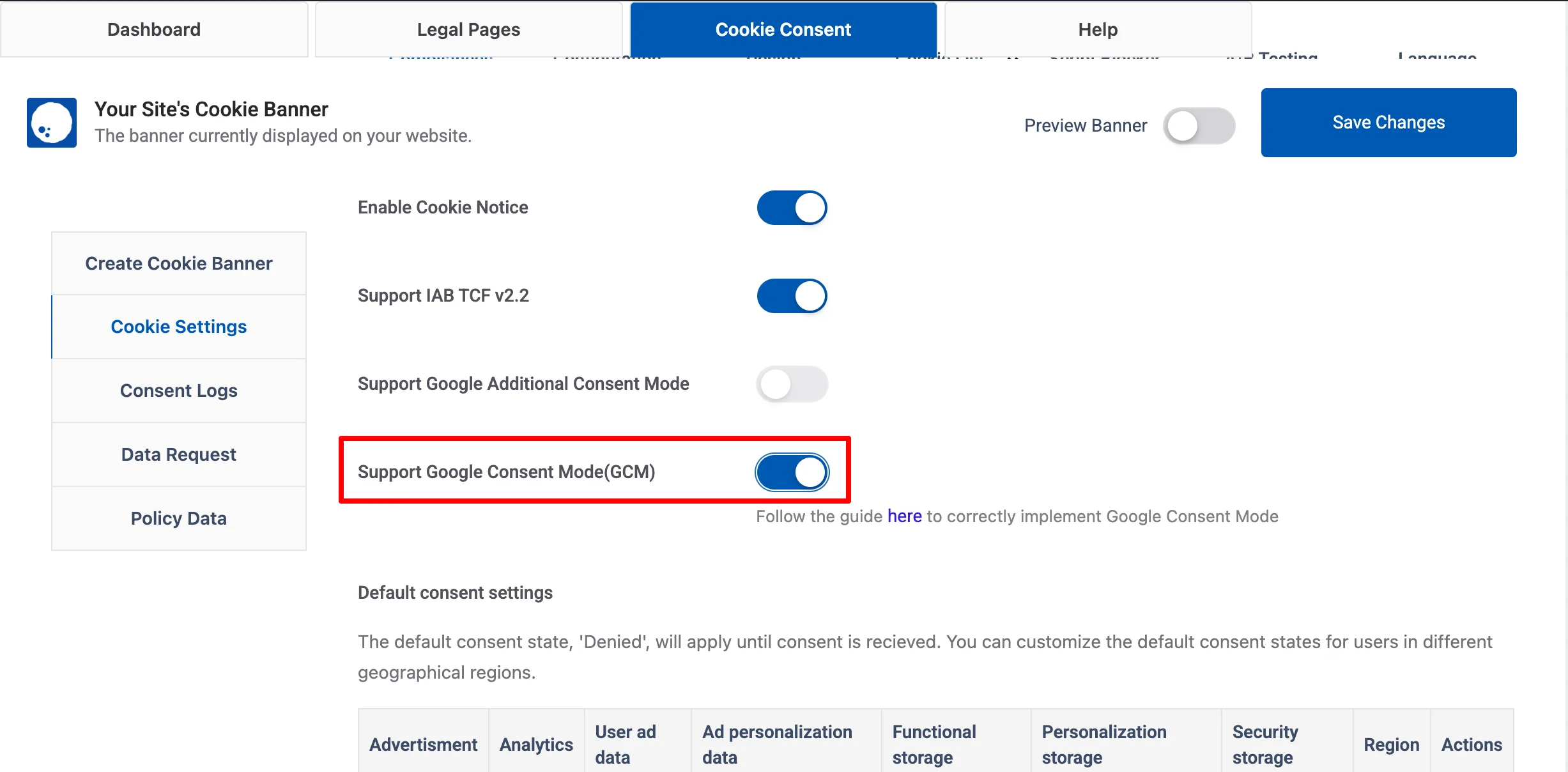
Note
5. DASR Forms
It is also important to have the DASR Forms (Data Access, Suppression, and Removal) on the website. It helps users regain ownership and control over their personal data. These forms give individuals a way to access to their data that is being collected about them.
By offering DASR forms to your cookie notice, you show that you respect your users’ privacy rights and are compliant with legislation like GDPR and CCPA.
Why WP Legal Pages Compliance Platform Is the Best Cookie Consent Solution
WP Legal Pages Compliance Platform offers an all-in-one solution for legal policies and cookie consent, helping website owners stay compliant effortlessly.
WP Legal Pages Compliance Platform’s Privacy Policy Generator and Consent Management can assist companies in complying with various data protection laws.
The privacy policy generator asks basic questions about your company and its data collection practices, and it employs those responses to create a complete, customized privacy policy.
Meanwhile, consent management platforms protect your websites with data protection laws by providing cookie consent banners. The best is that the CMP is both IAB TCF certified and compliant to Google consent mode
WP Cookie Consent Plugin- Compliance With Cookie Consent Best Practices
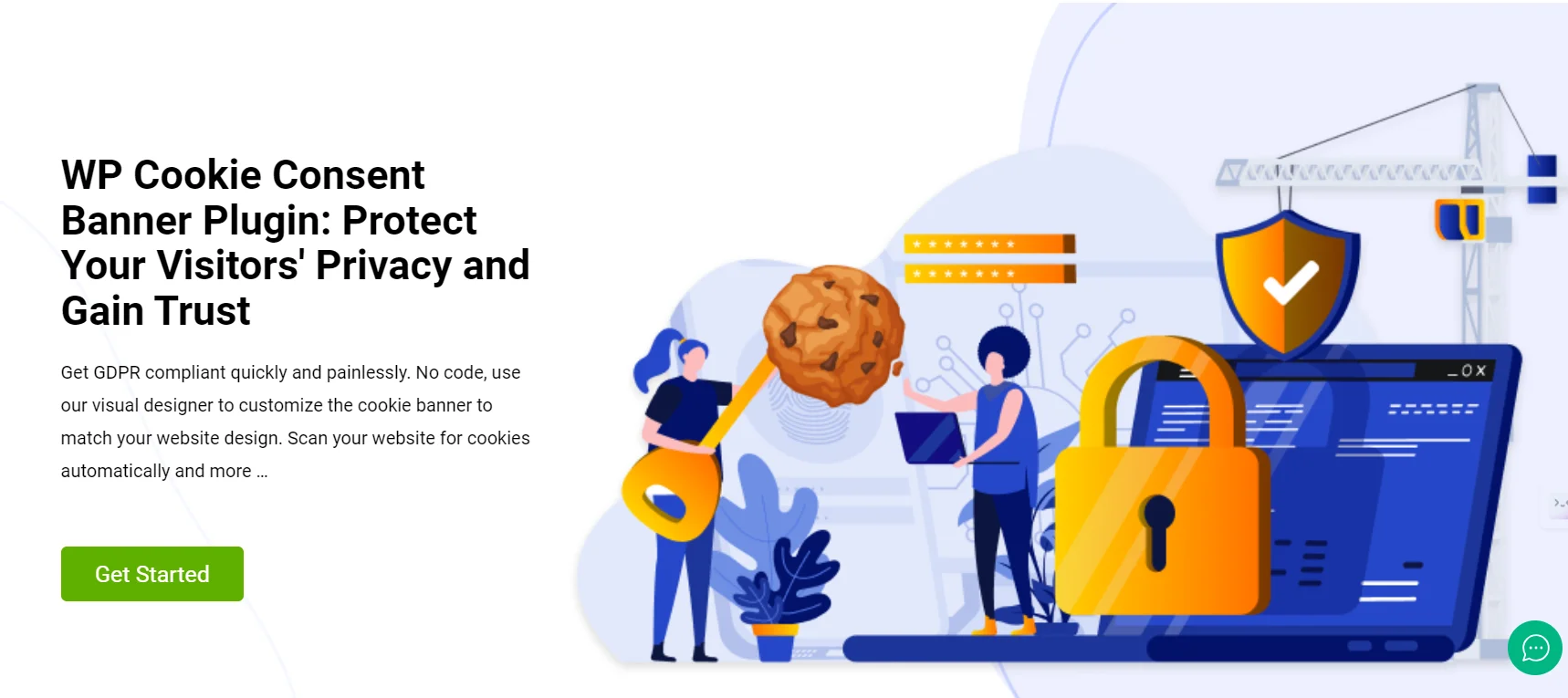
The WP Cookie Consent plugin is designed to help website owners comply with data protection laws, such as the General Data Protection Regulation (GDPR) and the California Consumer Privacy Act (CCPA), by obtaining user consent for using cookies on their website.
As data privacy regulations require websites to communicate their data collection policies and processes to users, this plugin is essential for ethical data processing.
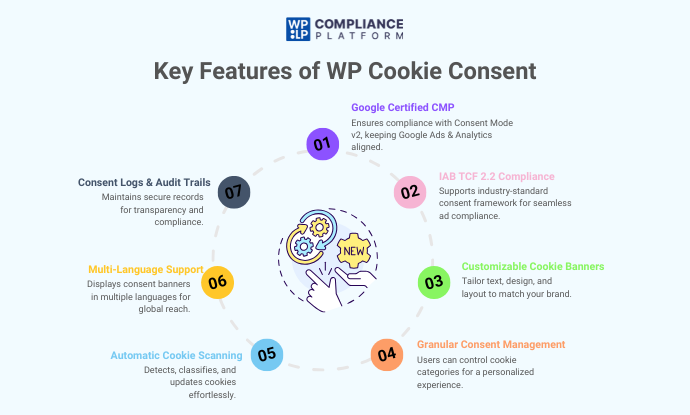
By choosing the WPLP Compliance Platform as your cookie consent solution, you can effectively manage cookie usage, enhance user experience, and ensure compliance with relevant regulations.
Designing an Effective Consent Banner
Getting an effective consent banner designed is now crucial for striking the balance between legal compliance and user experience. Important points to remember:
The placement and visibility of the banners are very important. The banner should be placed where users intuitively expect to find it- top or bottom of the webpage, and away from important content.
Make it possible for users to easily accept, reject, or set their own cookie preferences. Don’t make pre-ticked boxes or confusing labels on buttons. Also, consider that any disruption to the website’s style can be avoided.
WP Cookie Consent has pre-designed cookie banners that make it simple to keep the cookie banner creative yet attractive. The plugin has many options to choose from.
Here’s a look at the Cookie Banner Template:
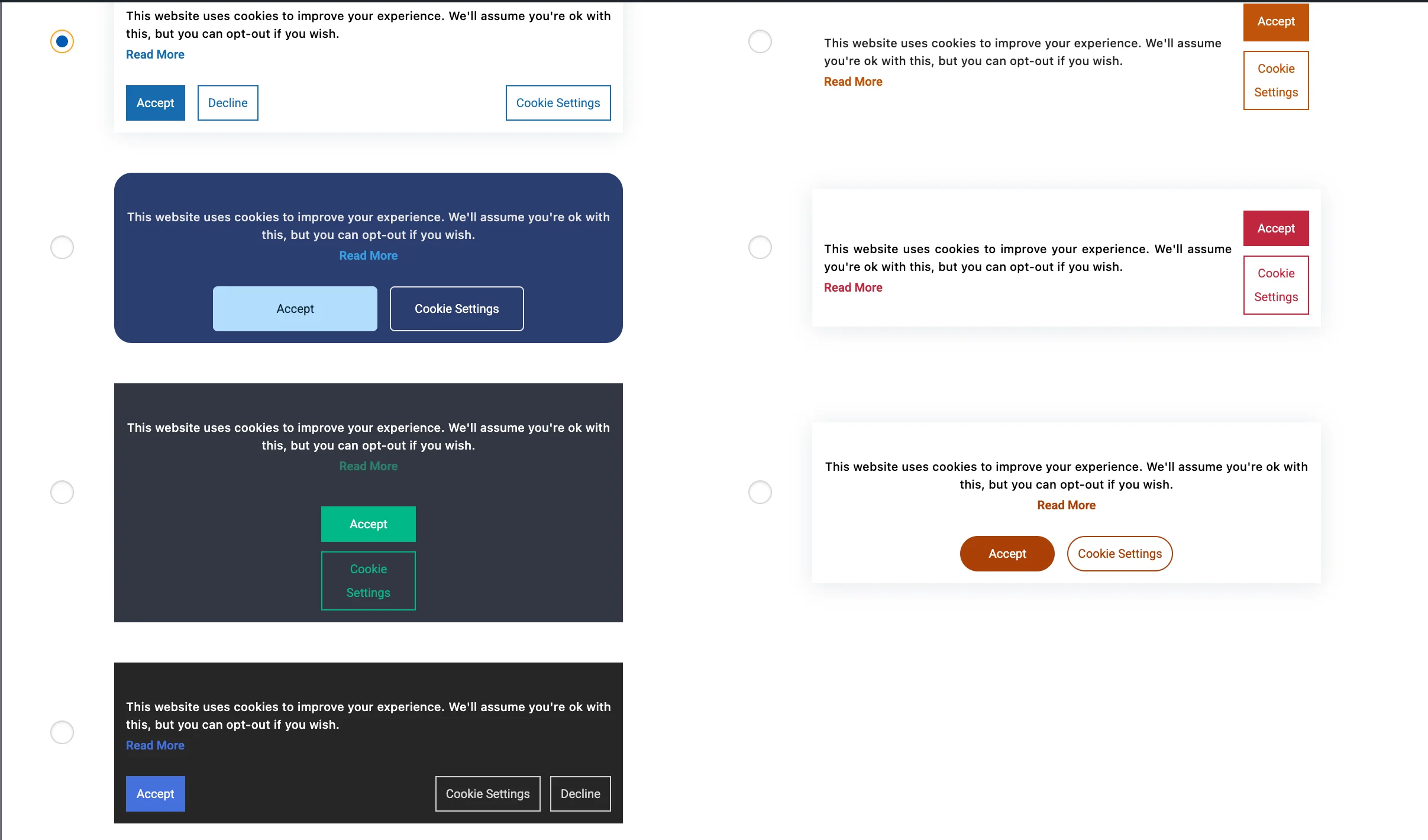
Here are Some Examples of Good vs. Bad Banners
Good Example: A banner on a website that has an important, clear, simple call-to-action available to the user and buttons with the option to “Accept All,” “Reject All,” or “Customize” the user’s choice, and an easy access to the privacy policy.
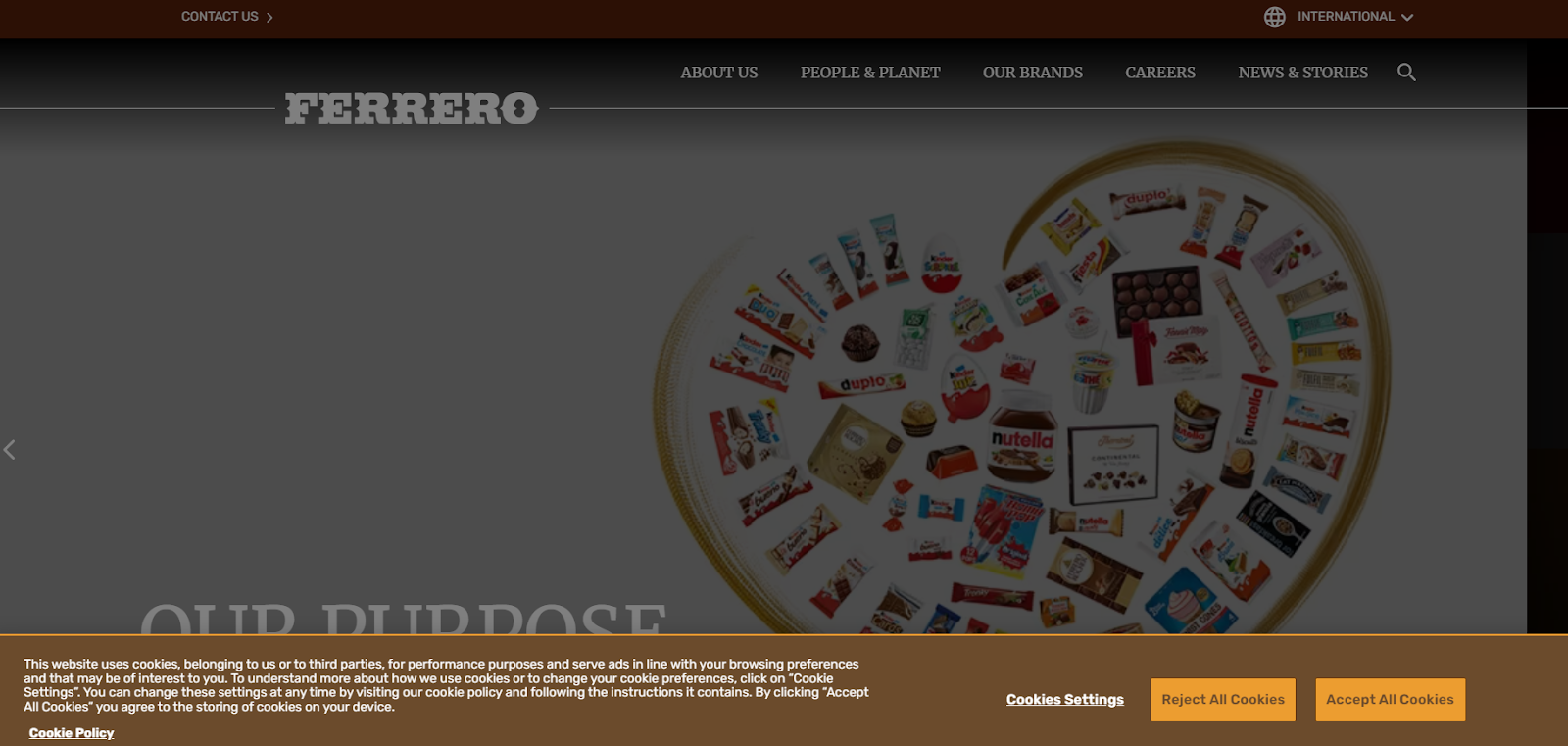
Bad Example: A banner with too much text, hard-to-read fonts, options located in hard-to-find locations, such as hiding “Reject” in a sub-menu.
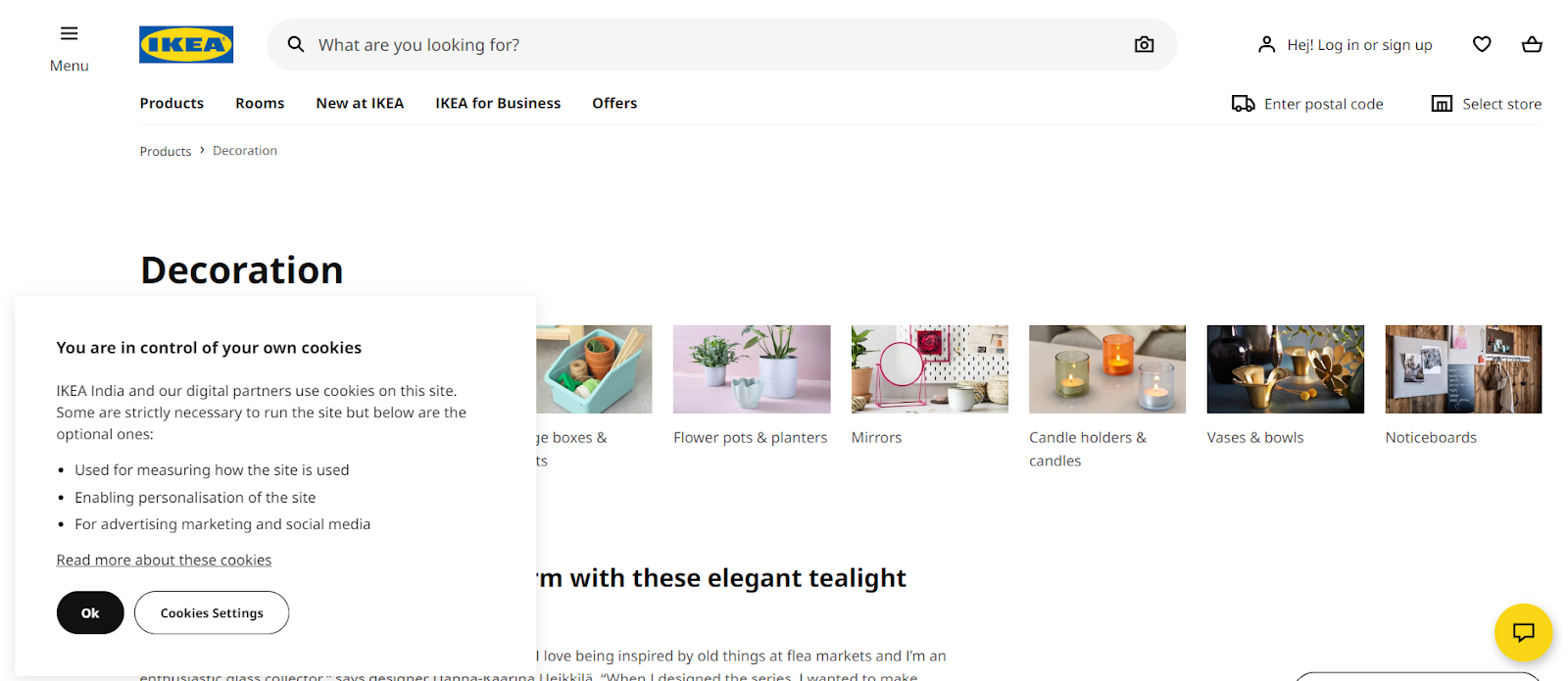
By being aware of how to present elements on a banner, companies can create consent banners that build trust and demonstrate compliance with applicable data protection laws and regulations.
Obtaining Valid Consent
From a legal and best-practices standpoint, user consent must be captured in relation to the use of a cookie. This means understanding explicit and implicit consent and then being able to choose an appropriate consent-gathering method.
Explicit vs. Implicit Consent
- Explicit: The users shall have to affirmatively act to indicate their consent, such as if they click on a button marking “Accept” or “Agree.” Therefore, it is regarded as the strongest form of consent, particularly under stringent data protection laws, such as the GDPR.
- Implicit: This assumes consent from the behavior of an individual, e.g., using a website after being notified of cookie use, which in some cases may be available, but usually will not suffice in specific legal frameworks.
Ways to Collect Consent
- Opt-in: Users must explicitly consent to using cookies before using the website.
- Opt-out: Users can continue using the website with cookies enabled unless they actively opt out.
How WP Cookie Consent Facilitates Consent Management
The WP Cookie Consent plugin allows managing consent through customizable consent banners that notify users of cookie use with a provision for personalized messaging or styling.
Users have the option of granular consent, allowing them to select the types of cookies they agree to use like necessary, analytics, or advertising cookies. The intuitive interface allows visitors to give or withdraw consent at their discretion.
The plugin blocks cookies that are not strictly necessary for your compliance under GDPR or CCPA until the user gives consent. Further, it also provides a detailed description of what cookies exist on your site, giving your users the chance to make better decisions on their cookie preferences.
These plugins support you in scanning your website for cookies. You can schedule cookie scans and schedule what cookies your site contains. It also provides you with unlimited scans monthly.
Finally, the logging and storage of consent records provide evidence of compliance if required. WP Cookie Consent mainly helps website owners manage user consent efficiently while being very transparent and establishing trust from their audience.
It also helps you keep your website data protection compliant while offering a good user experience and being transparent about cookie usage.
WP Cookie Consent Plugin is a freemium plugin. Many more features are offered in the paid version of the plugin to help you stay compliant with the consent laws. You have the option to pay either monthly or yearly.
| Plans | Pricing | ||
Monthly | Lite(1 Site) | Professional(3 Site) | Business(10 Site) |
| $0 | $8 | $12 | |
Yearly | Lite(1 Site) | Professional(3 Site) | Business(10 Site) |
| $0 | $48 | $72 | |
Conclusion
Adhering to cookie consent best practices is essential for building trust and ensuring compliance with regulations like the GDPR and CCPA.
The WP Legal Pages Compliance Platform, primarily through the WP Cookie Consent plugin, streamlines this process by offering customizable consent banners and granular control over cookie preferences.
By clearly informing users about cookie usage and providing straightforward consent options, website owners can enhance user experience while meeting legal requirements. Embracing these cookie consent best practices protects your business from penalties and fosters a transparent relationship with your audience.
If you’ve liked reading this article, check out our other engaging articles as well:
- What Is IAB TCF? – A Guide on Transparency and Consent Framework
- What Are the Data Privacy Laws Around The World
- Best GDPR WordPress Plugins
Want to follow Cookie consent best practices for your website? Grab the WP Cookie Consent plugin now!
